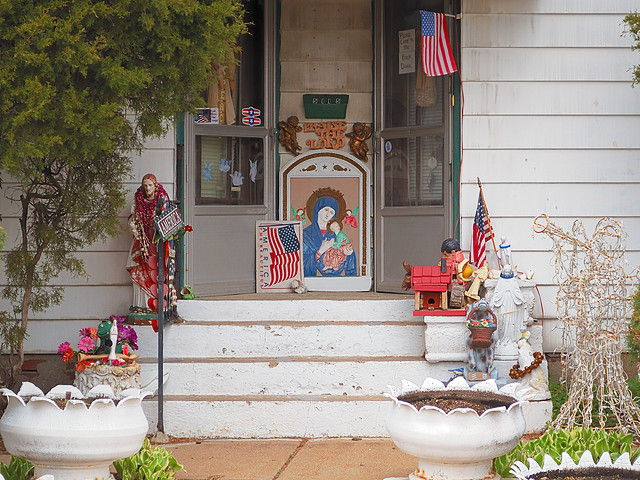
In the Saint Louis area, public displays of piety (although found scattered throughout the region) are most evident in the City of Saint Louis, more so in south side, and nowhere stronger than in the traditionally Italian Hill neighborhood.
The phrase ‘filial piety’, like the word ‘auspicious’, has a distinctively Oriental flavor, and these are nowadays mainly used when describing the traditional culture of east Asia.
In the traditional Chinese philosophy of Confucianism, filial piety (孝, hsiao or xiào) is among the chief virtues, and is respect for parents and ancestors. This virtue is extended to piety for kinsmen, teachers, and leaders. This is likewise extended in the other direction, where parents, teachers, and leaders have the duty to be careful with subordinates, and they are to be mild without arrogance. This is expressed in etiquette, and most critically, applies even if they think that the other person does not deserve it. Ultimately piety is extended all the way up; the pious person serves Heaven itself.
But the phrase ‘filial piety’ derives from Latin, and so we should not be surprised that it is described as a virtue by Saint Thomas Aquinas. In the West, the greatest of natural virtues is justice, and piety is considered to be a part of justice. Aquinas quotes Cicero in his definition of piety: “it is by piety that we do our duty towards our kindred and well-wishers of our country and render them faithful service.”
We find piety in the Old Testament, in the Ten Commandments: “You shall not have strange gods before me,” and “honour your father and your mother.”
Like the ancient Romans and the Chinese, we extend piety upwards towards kinsmen, country, and Heaven. It is a shame that we nowadays tend to separate piety into the categories of good family relations, patriotism, and religion, and think that we can dispose of them at will. But we can see that these are not three things, but one thing, and we have a duty to piety even if we think that it is undeserved, because it is a matter of justice. A person does not earn justice, they are owed it. [Note: I do not claim to be pious in any sense of the word. As usual, I am preaching to myself here.]
Contemporary thinkers find it puzzling that working class Americans show patriotism, even though the American system is designed to keep them down. Of course, whether these modern thinkers know it or not, contemporary philosophy (of both the Left and the Right varieties) is the chief reason why the working class is kept down. However, unless we have killed our conscience, we will have a natural inclination to piety, which includes patriotism. Patriotism is owed, not earned.
Like Satan, contemporary thinkers say non serviam — I will not serve — and yet ironically, or perhaps necessarily, they expect others to serve them; not out of duty, but out of fear. And so we have family law courts, compulsory education, conscript armies, severe work rules, a chaotic economy, and high taxation. They take advantage of piety, but at their own peril, for they are not living up to their side.
The Chinese see filial piety as the basis for social justice, and undoubtably we ought to think likewise. But does our ideology of justice and social justice incorporate piety? If not (and I think we do not) then we are not pursuing justice or social justice.
But there is something good that can come out of loyal service to others, not the least of which is a softening of the hearts of cruel superiors. Confucian texts illustrate this principle, as does sacred scripture. We find such a softening in history, where loyal service of faithful Catholics in France during the Great War caused a change of heart in the callous Third Republic. Early Christians in Rome displayed remarkable piety: following Christ, they rendered to Caesar his due, even to the point of willingly submitting themselves to the Roman law courts, even at the risk of being thrown to the wild beasts, for they also gave God His due piety.


No comments:
Post a Comment